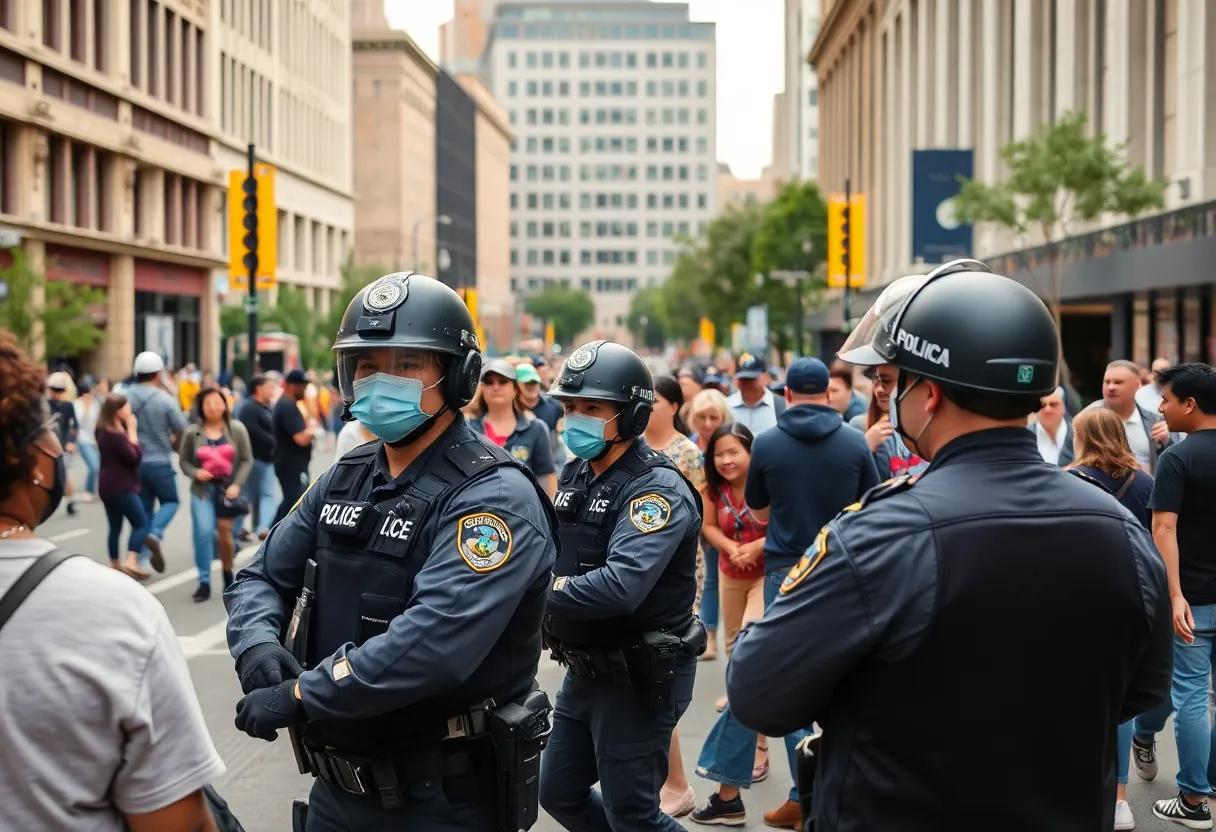News Summary
President Trump has escalated federal law enforcement presence in Washington, D.C. due to rising crime, claiming a need for public safety. This federal initiative has met resistance from local officials, who contend that crime rates are declining. With the complexities of local law enforcement dynamics being challenged, the situation reveals a deep political divide regarding perceptions of crime and safety.
Washington, D.C. – President Donald Trump has intensified the federal presence in the nation’s capital by deploying federal law enforcement officers and National Guard soldiers amid rising crime concerns. He has characterized Washington, D.C. as a city filled with “bloodshed, bedlam and squalor,” claiming violent gangs and criminals pose a significant threat to public safety. Trump has pledged to “reestablish law, order and public safety” in the district through an increased federal policing initiative.
However, this federal intervention has ignited a legal battle, particularly as it hinges on local law enforcement dynamics. James Comer, the U.S. House Oversight Committee Chairperson, targeted policies from Boston Mayor Michelle Wu, criticizing her “sanctuary city” policies as detrimental to public safety. Wu, along with D.C. Mayor Muriel Bowser, has refuted Trump’s negative characterization of crime in Washington, citing data that describes a significant decline in violent crime.
Recent data from the U.S. Justice Department reveals that violent crime in Washington, D.C. hit a 30-year low in 2024, with a notable 35% reduction compared to the previous year. Contrarily, while Boston experienced a surge in murders, with 17 homicides recorded in the first half of 2025 — marking a 143% increase from the same period in the previous year — experts anticipate a return to crime levels similar to 2023 by year-end, the lowest on record for the city.
Trump justified his call for increased federal policing following the recent homicide of a University of Massachusetts student, which he used to emphasize both a need for greater federal authority and his commitment to combating crime in D.C. While Mayor Bowser and Police Chief Pamela Smith have welcomed any additional federal resources to combat crime, they have also openly contested Trump’s portrayal of the situation, pointing out the downward trend of violent crime.
Crime and public safety have emerged as divisive topics, especially in neighborhoods directly impacted by violence. A Republican consultant noted that gun violence has increasingly encroached into family-friendly areas within D.C. Local business owners, such as a café operator in Boston, also voiced concerns regarding crime’s impact on tourism and visitors’ experience in the city.
Public perceptions around crime are sharply divided along partisan lines, with Republicans generally viewing it as a more urgent issue than Democrats. In light of this, Trump has indicated a desire to pursue Congressional approval to extend federal oversight over the D.C. police force. Nevertheless, such a move could face significant opposition from Democrat lawmakers.
Trump’s comments have sparked responses from mayors of other cities, including Chicago and Los Angeles, which are experiencing notable declines in violent crime despite having Black leadership. Baltimore Mayor Brandon Scott specifically criticized Trump’s assertions, highlighting the significant reductions in crime in cities overseen by Black mayors.
Analysis indicates that Trump’s measures may be driven more by political motivations than genuine public safety concerns. His administration had previously rescinded an order that would have replaced D.C.’s police chief with a federal official after a certain legal challenge surfaced from the city. The intervention saw checkpoints established and homeless encampments cleared, raising further concerns among community stakeholders.
Latest statistics show that violent crime in D.C. continues to trend downwards, reporting a 26% decrease this year compared to last year. Despite this positive development, many critics argue that Trump’s actions are politically charged and reflect an overreach of federal authority, rather than a substantive effort to address crime rates.
In light of the increased federal involvement, activists have taken steps to advise immigrants on adapting to the changes in policing in D.C., anticipating potential shifts in law enforcement approaches and public safety protocols stemming from this federal initiative. As discussions around policing, crime, and federal oversight unfold, the contentious dynamics present a significant focal point for residents and policymakers in Washington, D.C.
Deeper Dive: News & Info About This Topic
HERE Resources
Former Newton Police Chief Resigns to Focus on Health
Boston Police Veteran Sues Commissioner Over Demotion
Boston’s Courthouse Drama: DA Critiques ICE Tactics
Boston City Council Faces Pressure Over Controversial Grant
Boston’s Trust Act Under Review Amid Political Turmoil
Mayor Wu Faces Backlash Over Condolences to Stabbing Suspect
Boston’s Downtown Crossing Faces Surge in Crime
Boston Police Patrolmen’s Association Endorses Mayor Wu
Boston Faces Tensions After Federal Immigration Critique
Additional Resources
- BBC News
- Wikipedia: Policing in the United States
- Associated Press
- Google Search: Trump federal policing
- New York Times
- Google Scholar: Crime rates Washington DC
- Washington Post
- Encyclopedia Britannica: Crime
- CNN Politics
- Google News: Washington DC crime trends
- Politico

Author: STAFF HERE BOSTON WRITER
The BOSTON STAFF WRITER represents the experienced team at HEREBoston.com, your go-to source for actionable local news and information in Boston, Suffolk County, and beyond. Specializing in "news you can use," we cover essential topics like product reviews for personal and business needs, local business directories, politics, real estate trends, neighborhood insights, and state news affecting the area—with deep expertise drawn from years of dedicated reporting and strong community input, including local press releases and business updates. We deliver top reporting on high-value events such as Boston Marathon, Head of the Charles Regatta, and Boston Harborfest. Our coverage extends to key organizations like the Greater Boston Chamber of Commerce and Associated Industries of Massachusetts, plus leading businesses in finance, biotech, and insurance that power the local economy such as Fidelity Investments, Biogen, and Liberty Mutual Insurance. As part of the broader HERE network, we provide comprehensive, credible insights into Massachusetts's dynamic landscape.



